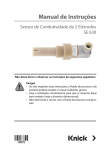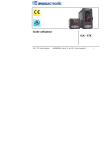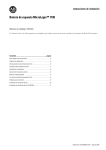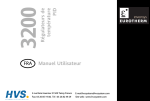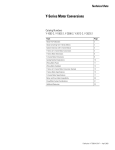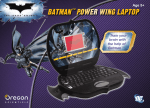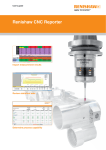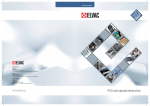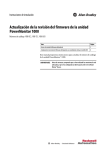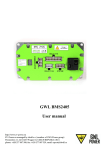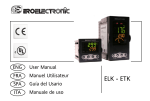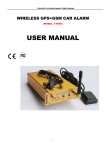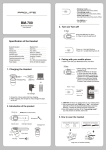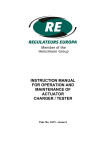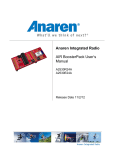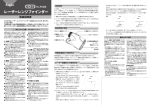Download TL-IN003 - Rockwell Automation
Transcript
Installation Instructions TL-Series Servo Motors Catalog Numbers TLY-A110, TLY-A120, TLY-A130, TLY-A220, TLY-A230, TLY-A2530, TLY-A2540, TLY-A310 Topic Page Catalog Number Explanation 3 Before You Begin 4 Installation and Maintenance Guidelines 4 Install the TL-Series Motor 8 Requirements for Motor Mounting 8 Power Cable Shielding 9 Installing the Motor 10 Dimensions 12 Motor Load Force Ratings 17 Connector Data 19 Remove and Install a Shaft Key 21 Specifications 22 Accessories 23 Additional Resources 24 About This Publication This publication provides installation instructions for the TL-Series motors categorized with a TLY catalog number. Use this document if you are responsible for installing these Allen-Bradley motor products. Please read all instructions before installing this motor. Publication TL-IN003A-EN-P — June 2007 2 TL-Series Servo Motors Important User Information Solid state equipment has operational characteristics differing from those of electromechanical equipment. Safety Guidelines for the Application, Installation and Maintenance of Solid State Controls, publication SGI-1.1, available from your local Rockwell Automation sales office or online at http://literature.rockwellautomation.com. It describes some important differences between solid state equipment and hard-wired electromechanical devices. Because of this difference, and also because of the wide variety of uses for solid state equipment, all persons responsible for applying this equipment must satisfy themselves that each intended application of this equipment is acceptable. In no event will Rockwell Automation, Inc. be responsible or liable for indirect or consequential damages resulting from the use or application of this equipment. The examples and diagrams in this manual are included solely for illustrative purposes. Because of the many variables and requirements associated with any particular installation, Rockwell Automation, Inc. cannot assume responsibility or liability for actual use based on the examples and diagrams. No patent liability is assumed by Rockwell Automation, Inc. with respect to use of information, circuits, equipment, or software described in this manual. Reproduction of the contents of this manual, in whole or in part, without written permission of Rockwell Automation, Inc., is prohibited. Throughout this manual, when necessary, we use notes to make you aware of safety considerations. WARNING IMPORTANT ATTENTION Identifies information about practices or circumstances that can cause an explosion in a hazardous environment, which may lead to personal injury or death, property damage, or economic loss. Identifies information that is critical for successful application and understanding of the product. Identifies information about practices or circumstances that can lead to personal injury or death, property damage, or economic loss. Attentions help you identify a hazard, avoid a hazard and recognize the consequences. SHOCK HAZARD Labels may be on or inside the equipment, for example, a drive or motor, to alert people that dangerous voltage may be present. BURN HAZARD Labels may be on or inside the equipment, for example, a drive or motor, to alert people that surfaces may reach dangerous temperatures. Publication TL-IN003A-EN-P — June 2007 TL-Series Servo Motors 3 Catalog Number Explanation TL Y - A 3 10 M - B J 6 2 AA FACTORY DESIGNATED OPTIONS AA = Standard AN = NEMA Mounting Flange/Shaft BRAKE 2 = No Brake 4 = 24V dc Brake CONNECTORS 6 = 1m (39.4 in.) Leads with Circular Plastic Connectors ENCLOSURE/SHAFT KEY/SHAFT SEAL J = IP65 Housing/Shaft Key/No Shaft Seal K = IP65 Housing/No Shaft Key/No Shaft Seal FEEDBACK B = Absolute Encoder, Battery-backed Multi-turn H = Incremental Encoder (2000 lines) RATED SPEED M = 4500 rpm P = 5000 rpm T = 6000 rpm MAGNET STACK LENGTH DESIGNATOR FLANGE SIZE Diameter of Mounting Bolt Circle for Metric Motors, or NEMA size 1 = 46 mm or NEMA 17 2 = 70 mm or NEMA 23 25 = 90 mm or NEMA 34 3 = 100 mm VOLTAGE RATING A = 230 V ac TYPE Y = Leads with Circular Connector SERIES DESIGNATOR TL = Low Inertia Publication TL-IN003A-EN-P — June 2007 4 TL-Series Servo Motors Before You Begin Before unpacking the product, inspect the shipping carton for damage. If damage is visible, immediately contact the shipper and request assistance. Otherwise, proceed with unpacking. Remove the motor carefully from its shipping container, and visually inspect the motor for any damage. Carefully examine the motor frame, front output shaft, and mounting pilot for any defects. Keep the original packing material in case you need to return the product for repair or transport it to another location. Use both the inner and outer packing cartons to verify adequate protection for a unit returned for service. ATTENTION Do not attempt to open and modify the motor. Modifications that can be performed in the field are described in this manual, other changes should not be attempted. Only a qualified Allen-Bradley employee can service this type of motor. Failure to observe these safety procedures could result in personal injury or damage to equipment. Installation and Maintenance Guidelines This section advises you on how to install your product so it provides safe and reliable service. To Prolong Motor Life Thoughtful design and proper maintenance can increase the life of a servo motor. • Always install the motor with the cable entry point(s) positioned underneath the motor housing, and provide a drip loop in each cable. A drip loop is a downward bend in the cable that lets water gather and drip off the cable rather than continue to flow along the cable. These two installation practices greatly reduce the potential for moisture related problems. Recommended Connector Orientation with Drip Loop Motor is positioned so cable enters from above, and cable lacks drip loop. Cable enters beneath the motor, and drip loop is formed. • Avoid installing the motor with the shaft pointing upward. This orientation increases the risk of contaminant ingress. • Avoid spraying liquids under pressure directly on the junction of the motor shaft, housing, and connectors, as well as the enclosure joints. Fluids under pressure can be forced around worn seals, and contaminate the motor bearings. Bearing contamination will significantly shorten the life of a servo motor. Publication TL-IN003A-EN-P — June 2007 TL-Series Servo Motors 5 • If design requirements permit, provide shields that protect the motor housing, shaft, seals and their junctions from product contamination, caustic agents, and high pressure fluids. • Replace the optional shaft seal at or before its expected twelve-month lifetime elapses. Refer to Remove and Install a Shaft Key on page 21 for more information on shaft seals. • Inspect the motor and seals for damage or wear on a regular basis. If damage or adverse wear is suspected, replace the item. • If desired, the motor front flange may be sealed to the driven equipment by a bead of RTV around the periphery of the motor to equipment joint. Use of a gasket or RTV on the mating surfaces may cause misalignment of the shaft and result in damage to the motor and driven equipment. • Brakes on these servo motors are holding brakes. The brakes are spring-set, and release when voltage is applied to the brake coil. A power source, either external or internal to the servo drive, is required to disengage the brake. The power source may be applied by the machine controller. If system main power fails, holding brakes can withstand occasional use as stopping brakes. However, this is potentially damaging to the system, increases brake wear, and reduces brake life. IMPORTANT Holding brakes are not designed to stop rotation of the motor shaft, nor are they intended to be used as a safety device. They are designed to hold a motor shaft at 0 rpm for up to the rated brake holding torque. Follow these steps to prevent shaft rotation. 1. Command the servo drive to 0 rpm. 2. Verify the motor is at 0 rpm. 3. Engage the brake. 4. Disable the drive. Disabling the drive removes the potential for brake wear caused by a badly tuned servo system oscillating the shaft. Publication TL-IN003A-EN-P — June 2007 6 TL-Series Servo Motors Mechanical Connections Mechanical connections to the motor shaft, such as couplings and pulleys, require a torsionally rigid coupling or a reinforced timing belt. The high dynamic performance of servo motors can cause couplings, pulleys, or belts to loosen or slip over time. A loose or slipping connection will cause system instability and may damage the motor shaft. All connections between the machine and the motor shaft must be rigid to achieve acceptable system response. Periodically inspect connections to verify their rigidity. When mounting couplings or pulleys to the shaft, verify that the connections are properly aligned and that axial and radial loads are within the specifications of the motor. Refer to Motor Load Force Ratings on page 17 for guidelines on how to achieve 20,000 hours of motor bearing life. ATTENTION Do not strike the shaft, key, couplings, or pulleys with tools during installation or removal. Damage may occur to the motor bearings and the feedback device if sharp impact to the shaft is applied during installation of couplings and pulleys, or a shaft key. Damage to the feedback device also may result by applying leverage from the faceplate to remove devices mounted on the motor shaft. Apply a constant pressure, with a wheel puller for example, to the user end of the shaft to remove a friction fit or a stuck device. Failure to observe these safety procedures could result in damage to the motor and its components. A shaft key provides a rigid mechanical connection with the potential for self-alignment, but the key must be properly installed in the keyway. Refer to these sections for additional information: • Dimensions on page 12 for dimensional information about the key and shaft keyway. • Remove and Install a Shaft Key on page 21 for recommendations on how to remove and install a shaft key. Publication TL-IN003A-EN-P — June 2007 TL-Series Servo Motors 7 Interconnect Cables Knowledgeable cable routing improves system electromagnetic compatibility (EMC). Refer to Shielding of Brake Wires Within the Power Cable on page 9 for cable shield grounding at the servo drive. Follow these steps to install the cables. 1. Keep wire lengths as short as physically possible. 2. Route signal cables away from motor and power wiring. Typical signal cables transmit encoder, serial, or analog data at low voltages. 3. Separate cables by 0.3 m (1 ft) minimum for every 9 m (30 ft) of parallel run. 4. Ground both ends of the cable shield and twist the signal wire pairs to prevent electromagnetic interference (EMI) from other equipment. ATTENTION High voltage can be present on the shields of a power cable, if the shields are not grounded. Verify there is a connection to ground for all shields in the power cable. Failure to observe these safety procedures could result in personal injury or damage to equipment. Electrical Noise ElectroMagnetic Interference (EMI), commonly called noise, adversely impacts motor performance by inducing stray signals. Effective techniques to counter EMI include filtering the ac power, shielding and separating signal carrying lines, and practicing good grounding techniques. Effective ac power filtering can be achieved by using isolated ac power transformers or properly installed ac line filters. To reduce EMI follow these guidelines: • Physically separate signal lines from motor cabling and power wiring. Do not route signal wires with motor and power wires, and do not route signal wires over the vent openings of servo drives or other electrical power sources. • Ground all equipment by using a single-point parallel ground system that employs ground bus bars or large straps. If necessary, use additional electrical noise reduction techniques to reduce EMI in noisy environments. Publication TL-IN003A-EN-P — June 2007 8 TL-Series Servo Motors Shaft Seals You may install the optional shaft seal to protect the front bearing from fluids or fine dust that could contaminate the motor bearing and reduce its lifetime. The IP rating for the motor depends on the usage of shaft seals. Refer to these sections for additional information: • Shaft Seal Kits on page 23 lists catalog numbers of seal kits available for your motor. • Specifications on page 22 briefly describes IP ratings. Install the TL-Series Motor Before installing the motor, review and become familiar with the following instructions: • • • • • • Requirements for Motor Mounting Power Cable Shielding Installing the Motor Dimensions Motor Load Force Ratings Connector Data Requirements for Motor Mounting All TL-Series motors include a mounting pilot for aligning the motor on a machine. Preferred fasteners are stainless steel. The installation must comply with all local regulations and use of equipment and installation practices that promote electromagnetic compatibility and safety. ATTENTION Unmounted motors, disconnected mechanical couplings, loose shaft keys, and disconnected cables are dangerous if power is applied. Disassembled equipment should be appropriately identified (tagged-out) and have access to electrical power restricted (locked-out). Before applying power to the motor, remove the shaft key and other mechanical couplings that could be thrown from the shaft. Failure to observe these safety procedures could result in personal injury. Publication TL-IN003A-EN-P — June 2007 TL-Series Servo Motors 9 Power Cable Shielding Power cables must be shielded, and the cable shield must connect to a ground. ATTENTION High voltage can be present on the shields of a power cable, if the shields are not grounded. Verify there is a connection to ground for all shields in the power cable. Failure to observe these safety procedures could result in personal injury or damage to equipment. Verify the separate brake wire shield connects to the overall chassis ground by looping back this brake wire pair as shown in the figure Shielding of Brake Wires Within the Power Cable. Shielding of Brake Wires Within the Power Cable Factory supplied } Field Modified Power cable contains brake wires with separate ground shield. Cable insulation is removed to expose overall power cable shield. Loop brake wires and signal shielding to contact the overall power cable shield. Connect shields to power cable ground clamp on drive Clamp should contact both (overall and brake) cable shields. Publication TL-IN003A-EN-P — June 2007 10 TL-Series Servo Motors Installing the Motor Follow these procedures and recommendations to install a TL-Series motor. ATTENTION Servo motors are not for direct connection to an ac power line. Servo motors are designed for connection to a servo drive that controls the application of ac power. Failure to observe these safety procedures could result in damage to the motor and equipment. ATTENTION Do not strike the shaft, couplings, or pulleys with tools during installation or removal. Damage may occur to the motor bearings and the feedback device if sharp impact to the shaft is applied during installation of couplings and pulleys. Failure to observe these safety procedures could result in damage to the motor and its components. 1. Allow sufficient clearances in the area of the motor for it to stay within its specified operating temperature range. • Obtain the specified motor thermal rating by mounting the motor on a surface with heat dissipation equivalent to an aluminum heatsink of the following dimensions. Motor Frame Size Heatsink Dimensions (H x W x D) Approx. (1) millimeters (inches) TLY-A1xx 203.0 x 203.0 x 6.4 (8 x 8 x 0.25) TLY-A2xx 254.0 x 254.0 x 6.4 (10 x 10 x 0.25) TLY-A25xx, TLY-3xx 305.0 x 305.0 x 12.7 (12 x 12 x 0.5) (1) Ambient temperature of the specified heatsink is 40 °C (104 °F). • Refer to Specifications on page 22 for the operating range. • Do not install the motor in an area with restricted airflow, and keep other heat producing devices away from the motor. Publication TL-IN003A-EN-P — June 2007 TL-Series Servo Motors ATTENTION 11 Outer surfaces of the motor can reach high temperatures, 110 °C (230 °F) during motor operation. Take precautions to prevent accidental contact with hot surfaces. Locate the motor and route cable connections to avoid contact with hot surfaces. Failure to observe these safety procedures could result in personal injury or damage to equipment. 2. Position the motor with the cable connections beneath the motor. Refer to Recommended Connector Orientation with Drip Loop on page 4 for a visual reference of correct motor and cable positioning. 3. Properly mount and align the motor. • Refer to Dimensions on page 12 to properly locate and size motor mounts. • Do not exceed the Motor Load Force Ratings on page 17. The tables list the radial and axial shaft load limitations of your motor. 4. Connect the feedback, and the combined power and brake cables after the motor is mounted. ATTENTION Mount the motor so exposure to dust and liquids is minimized for both the motor and its cable connections, and restrain cables to prevent uneven tension or flexing at the connectors. Short circuits in the feedback, power, or brake circuits may result from exposure of the unsealed motor cable connectors to dust or liquids, or by uneven forces at the connector housing. Failure to observe these safety procedures could result in personal injury or damage to the motor and equipment. ATTENTION Servo drive power must be turned off before connecting or disconnecting the cables to the motor, and if a cable is left disconnected at the motor end. Arcing or unexpected motion could occur if the feedback, power or brake cables are connected or disconnected while power is applied to the servo drive. Failure to observe these safety procedures could result in personal injury or damage to the motor and equipment. Publication TL-IN003A-EN-P — June 2007 12 TL-Series Servo Motors Dimensions Dimensions are supplied for non-brake motors. Footnotes provide additional dimensions for brake motors, and tolerances for common dimensions. All dimensions are approximate. References for Motor Dimensions Mounting pattern has two holes for A110 through A130 (shown). All others have four holes. L LB P N NB L-LB T Key (supplied) for motors with key slot. TB D HD S dia. holes on M dia. bolt circle. AD LE LA BE G F Motor Dimensions for Metric Frame CAB Mounting pattern has two threaded holes for A120 and A130 (shown). All others have four holes. L AC LB L-LB T P N S dia. holes on M dia. bolt circle. D HD AD BE LA LE CAB Motor Dimensions for NEMA Mount Publication TL-IN003A-EN-P — June 2007 Key supplied with TLY-A2xx and TLY-A25xx (NEMA 23 and 34) only. TLY-A120 or TLY-A130 (NEMA 17) is not available with key slot. G F TL-Series Servo Motors 13 Metric Frame Dimensions, Approx. Motor AD BE D1 HD L2 L-LB 3 LA LB 2 LE 2 M Series mm (in.) mm (in.) mm (in.) mm (in.) mm (in.) mm (in.) mm (in.) mm (in.) mm (in.) mm (in.) TLY-A 78.5 (3.09) 110 120 31.1 (1.22) 21.0 (0.83) 8.0 (0.315) 51.1 (2.01) 12.0 (0.4724) 43.0 (1.69) 73.0 (2.87) 230 2530 53.0 (2.09) 27.6 (1.09) 2540 310 25.0 (0.984) 5.0 (0.20) 98.5 (3.88) 130 220 84.5 (3.33) 53.5 (2.11) 56.0 (2.20) 16.0 (0.6299) 93.0 (3.66) 99.0 (3.90) 106.1 (4.18) 128.1 (5.04) 39.1 (1.54) 46.0 (1.811) 42.8 (1.69) 70.0 (2.76) 43.8 (1.72) 90.0 (3.54) 57.1 (2.25) 100.0 (3.94) 73.5 (2.89) 30.0 (1.181) 6.0 (0.24) 76.1 (3.00) 98.1 (3.86) 99.7 (3.93) 134.7 (5.30) 143.7 (5.66) 59.5 (2.34) 35.0 (1.378) 8.0 (0.32) 179.2 (7.06) 108.7 (4.28) 144.2 (5.68) Metric motor frames are designed to metric dimensions. Inch dimensions are a mathematical conversion. 1 Tolerance for this dimension is: TLY-A1xx -0.009 mm (-0.0004 in.); TLY-A2xx -0.011 mm (-0.0004 in.); TLY-A25xx -0.011 mm (-0.0004 in.); TLY-A310 -0.011 mm (-0.0004 in.). 2 TLY-A110, TLY-A120, or TLY-A130 motor with brake, add 35.6 mm (1.40 in.) to L, LB, and LE. TLY-A220 and TLY-A230 motor with brake, add 34.6 mm (1.36 in.) to L, LB, and LE. TLY-A2530, or TLY-A2540 motor with brake, add 36.6 mm (1.44 in.) to L, LB, and LE. TLY-310 motor with brake, add 23.0 mm (0.90 in.) to L, LB, and LE. 3 Tolerance for this dimension is: ±1.0 mm (±0.039 in.). Publication TL-IN003A-EN-P — June 2007 14 TL-Series Servo Motors Metric Frame Dimensions, Approx. (cont.) Motor N4 NB P S5 T TB CAB 6 G7 F8 Key 9 Series mm (in.) mm (in.) mm (in.) mm (in.) mm (in.) mm (in.) mm (in.) mm (in.) mm (in.) mm (in.) TLY-A 110 120 30.0 (1.1811) 20.0 (0.79) 40.0 (1.57) 4.5 (0.177) 50.0 (1.9685) 27.0 (1.06) 60.0 (2.36) 5.5 (0.217) 2.5 (0.10) 3 x 3 x 15 6.2 3.0 (0.118 x 0.118 x (0.244) (0.118) 0.59) 4.5 (0.18) 130 220 1000 (39.4) 230 2530 70.0 (2.7556) 2540 310 34.0 (1.34) 80.0 (3.15) 80.0 (3.15) 3.0 (0.12) 4 x 4 x 15 9.5 4.0 (0.158 x 0.158 x (0.374) (0.157) 0.59) 7.0 (0.28) 6.6 (0.260) 5 x 5 x 20 13.0 5.0 (0.197 x 0.197 x (0.512) (0.197) 0.79) 86.0 (3.39) Metric motor frames are designed to metric dimensions. Inch dimensions are a mathematical conversion. 4 Tolerance for this dimension is: TLY-A1xx -0.021 mm (-0.0008 in.); TLY-A2xx -0.025 mm (-0.001 in.); TLY-A25xx -0.03 mm (-0.0012 in.); TLY-A310 -0.03 mm (-0.0012 in.). 5 TLY-A1xx has two mounting holes, TLY-A2xx…TLY-A310 have four mounting holes. Mounting holes are S diameter on M diameter bolt circle. 6 Tolerance for cable length is ±50.0 mm (±1.97 in.). Minimum bend radius is 15.00 mm (0.59 in.). 7 Tolerance for this dimension is: -0.20 mm (-0.008 in.). 8 Tolerance for this dimension is: TLY-A1xx -0.006…-0.031 mm (-0.0002…-0.0012 in.); TLY-A2xx, TLY-A25xx and TLY-A3xx -0.012…-0.042 mm (-0.0005…-0.0017 in.). 9 X-Y tolerance for this dimension is: TLY-A1xx -0.025 mm (-0.001 in.); TLY-A2xx, TLY-A25xx and TLY-A3xx -0.03 mm (-0.0012 in.). Length is untoleranced. Publication TL-IN003A-EN-P — June 2007 TL-Series Servo Motors 15 NEMA Mount Dimensions, Approx. Motor AC AD BE D1 HD L2 L-LB 3 LA LB 2 LE 2 M Series mm (in.) mm (in.) mm (in.) mm (in.) mm (in.) mm (in.) mm (in.) mm (in.) mm (in.) mm (in.) mm (in.) TLY-A 120 91.5 (3.603) 130 27.0 105.5 (1.063) (4.153) 220 137.9 (5.43) — 60 (2.36) 31.10 (1.22) 6.35 (0.25) 12.70 (0.50) 43.0 (1.69) 230 2530 21.0 (0.83) 52.0 (2.05) 73.0 (2.87) 27.6 (1.09) — 53.0 (2.09) 15.875 (0.625) 2540 96.0 (3.78) 159.9 (6.30) 38.1 (1.50) 149.2 (5.872) 44.5 158.2 (1.752) (6.205) 5.0 (0.20) 6.0 (0.24) 8.0 (0.32) 64.5 (2.54) 78.5 (3.09) 99.8 (3.93) 121.8 (4.80) 104.7 (4.12) 113.7 (4.48) 39.1 (1.54) 43.8 (1.725) 43.3 (1.70) 66.7 (2.625) 43.8 (1.72) 98.4 (3.875) NEMA motor flanges and shafts are designed to inch dimensions. Other frame areas are designed to metric dimensions. Conversions are mathematically calculated. 1 Tolerance for this dimension is: TLY-A1xx -0.009 (-0.0004); TLY-A2xx -0.011 (-0.0004); TLY-A25xx -0.011 (-0.0004). 2 TLY-A120, or TLY-A130 motor with brake, add 35.6 mm (1.40 in.) to L, LB, and LE. TLY-A220, or TLY-A230 motor with brake, add 34.6 mm (1.36 in.) to L, LB, and LE. TLY-A2530, or TLY-A2540 motor with brake, add 36.6 mm (1.44 in.) to L, LB, and LE. 3 Tolerance for this dimension is: ±1.0 mm (±0.039 in.). Publication TL-IN003A-EN-P — June 2007 16 TL-Series Servo Motors NEMA Mount Dimensions, Approx. (cont.) Motor N4 NB P S5 T TB CAB 6 G7 F8 Key 9 Series mm (in.) mm (in.) mm (in.) mm (in.) mm (in.) mm (in.) mm (in.) mm (in.) mm (in.) mm (in.) TLY-A 120 22.0 (0.8661) — 42.0 (1.65) 8-32 Thread 2.0 (0.08) — 1000 (39.4) — — — 38.1 (1.50) — 56.4 (2.22) 5.5 (0.217) 1.5 (0.06) — 1000 (39.4) 10.92 (0.43) 3.175 (0.125) (0.125 x 0.125 x 0.9375) 73.02 (2.875) — 86.0 (3.39) 5.5 (0.217) 1.6 (0.06) — 1000 (39.4) 13.13 4.763 (0.187 x 0.187 (0.517) (0.1875) x 1.156) 130 220 230 2530 2540 NEMA motor flanges and shafts are designed to inch dimensions. Other frame areas are designed to metric dimensions. Conversions are mathematically calculated. 4 Tolerance for this dimension is: TLY-A1xx -0.021 mm (-0.0008 in.); TLY-A2xx -0.025 mm (-0.001 in.); TLY-A25xx -0.03 mm (-0.0012 in.). 5 TLY-A1xx has two threaded holes, TLY-A2xx and TLY-A25xx have four mounting holes. Mounting holes are S diameter on M diameter bolt circle. 6 Tolerance for cable length is ±50.0 mm (±1.97 in.). Minimum bend radius is 15.00 mm (0.59 in.). 7 Tolerance for this dimension is: -0.38 mm (-0.015 in.). 8 Tolerance for this dimension is: +0.051 mm (+0.002 in.). 9 X-Y tolerance for this dimension is: TLY -0.051 mm (-0.002 in.). Length is untoleranced. Publication TL-IN003A-EN-P — June 2007 TL-Series Servo Motors 17 Motor Load Force Ratings Motors are capable of operating with a sustained shaft load. The radial and axial load force location, and maximum values are provided. Load Forces on the Shaft Radial load force is applied at the midpoint of the shaft extension. Axial load force is applied at the center of the shaft diameter. The following tables represent 20,000-hour L10 bearing fatigue life at various loads and speeds. The 20,000-hour life does not account for application-specific life reduction that can occur due to bearing grease contamination from external sources. Loads are measured in pounds. Kilograms are a mathematical conversion. Radial Load Force Ratings Motor 1000 rpm 2000 rpm 3000 rpm 4500 rpm 5000 rpm kg (lb) kg (lb) kg (lb) kg (lb) kg (lb) TLY-A110 11 (24) 9 (19) 7 (16) – – 6 (14) TLY-A120 12 (26) 10 (21) 8 (18) – – 7 (15) TLY-A130 13 (29) 10 (23) 9 (20) – – 8 (17) TLY-A220 27 (60) 22 (48) 19 (42) – – 16 (35) TLY-A230 31 (68) 24 (54) 21 (47) – – 18 (40) TLY-A2530 48 (106) 38 (84) 34 (74) – – 28 (62) TLY-A2540 50 (110) 39 (87) 34 (76) – – 29 (64) TLY-A310 80 (177) 64 (140) 56 (123) 47 (103) – – Publication TL-IN003A-EN-P — June 2007 18 TL-Series Servo Motors Axial Load Force Ratings (maximum radial load) Motor 1000 rpm 2000 rpm 3000 rpm 4500 rpm 5000 rpm kg (lb) kg (lb) kg (lb) kg (lb) kg (lb) TLY-A110 8 (18) 6 (14) 5 (10) – – 4 (9) TLY-A120 9 (20) 7 (16) 5 (12) – – 5 (10) TLY-A130 10 (22) 8 (17) 6 (13) – – 5 (11) TLY-A220 15 (32) 11 (24) 9 (20) – – 7 (16) TLY-A230 15 (34) 12 (26) 10 (21) – – 8 (17) TLY-A2530 18 (39) 13 (29) 11 (24) – – 9 (19) TLY-A2540 18 (39) 13 (29) 11 (25) – – 9 (20) TLY-A310 24 (54) 18 (40) 15 (34) 12 (27) – – Axial Load Force Ratings (zero radial load) Motor 1000 rpm 2000 rpm 3000 rpm 4500 rpm 5000 rpm kg (lb) kg TLY-A110 12 (26) 9 (lb) kg (lb) kg (lb) kg (lb) (20) 7 (16) – – 6 TLY-A120 12 (26) 9 (13) (20) 7 (16) – – 6 (13) TLY-A130 12 (26) TLY-A220 19 (41) 9 (20) 7 (16) – – 6 (13) 14 (30) 11 (25) – – 9 TLY-A230 19 (20) (41) 14 (30) 11 (25) – – 9 TLY-A2530 (20) 23 (50) 17 (37) 14 (31) – – 11 (25) TLY-A2540 23 (50) 17 (37) 14 (31) – – 11 (25) TLY-A310 29 (65) 22 (48) 19 (41) 15 (32) – – Publication TL-IN003A-EN-P — June 2007 TL-Series Servo Motors 19 Connector Data These tables provide signal descriptions for servo motors with TLY catalog numbers. Absolute Encoder Feedback Connections Pin Signal 1…5 Reserved 6 BAT+ 7…12 Reserved 13 DATA+ 14 DATA15…21 Reserved 22 EPWR 5V 23 ECOM & BAT24 SHIELD 25…28 Reserved Connector Pinouts Feedback Connector Tyco AMP 206152-1 — Brown — Blue Blue/black — Red Black Drain wire — Power and Brake Connections Pin Signal 1 U phase Red 2 V phase White 3 W phase Black 4 Reserved — 5 Ground Yellow/grn & drain wires 6 7 8 9 Reserved MBRK+ Reserved MBRK- ATTENTION — Yellow — Blue 1 4 9 15 21 26 3 8 14 20 25 28 Power and Brake Connector Tyco AMP 206705-2 1 3 4 6 7 9 Incremental Encoder Feedback Connections Pin Signal 1…8 Reserved — 9 AM+ Green 10 AMGreen/blk 11 BM+ Blue 12 BMBlue/blk 13 IM+ Yellow 14 IMYellow/blk 15 S1+ Grey/blk 16 S1Grey 17 S2+ Brown/blk 18 S2Brown 19 S3+ White/blk 20 S3White 21 Reserved — 22 EPWR 5V Red 23 ECOM Black 24 SHIELD Drain wire 25…28 Reserved — Power and Brake Connections Pin Signal 1 U phase Red 2 V phase Black 3 W phase White 4 Reserved — 5 Ground Yellow/grn & drain wires 6 7 8 9 Reserved MBRK+ Reserved MBRK- — Yellow — Blue Be sure that cables are installed and restrained to prevent uneven tension or flexing at the cable connectors. Excessive and uneven force at the cable connector may result in damage to the housing and contacts as the cable flexes. Failure to observe these safety procedures could result in damage to the motor and its components. Publication TL-IN003A-EN-P — June 2007 20 TL-Series Servo Motors Connector Type Feedback - 28 Position Power - 9 Position Motor Connectors Connector housing 206152-1 206705-2 Connector backshell 206070-8 206966-7 1658540-4 (5) 1658540-5 (5) A110…A130 A220…A310 66102-9 (7) 66098-9 (8) (7) 66103-4 66099-4 (8) Signal and power contact pins (1) Reel Loose Ground contact pins (2) Reel Loose — Brake contact pins (3) Reel Loose — 164161-4 164164-2 66106-8 66107-4 Compatible Connectors for Mating Cables Connector housing 205839-3 206708-1 Connector backshell 206070-8 206966-7 Contact sockets Reel Loose 1658538-2 (6) 66505-9 (6) 66100-9 (8) 66101-4 (8) Tools for Motor Connectors or Compatible Connectors Hand crimp tool Contact tool Extraction and insertion - feedback Extraction - power and brake Extraction - ground Insertion - power, brake, and ground (4) 91503-1 58495-1 91285-1 305183 725840-1 91002-1 Tyco AMP specifies wire sizing in AWG, mm2 is a conversion from AWG in the footnotes. (1) For U, V, and W power phases in the power connector. (2) For motor frame ground in the power connector. (3) For motor brake in the power connector. (4) Use of the contact insertion tool is optional, as contacts are readily pushed by hand into the connector housing. After contacts are inserted into the connector housing, gently pull backward on each wire to be sure that contacts are fully seated and latched into position. (5) Wire range is 0.08…0.2 mm2 (28…24 AWG). (6) Contacts and wire gauge used in Rockwell cables may vary by cable conductor. For reference only, the wire range of these contacts is 0.08…0.2 mm2 (28…24 AWG). (7) Wire range is 0.2…0.6 mm2 (24…20 AWG). (8) Wire range is 0.8…1.4 mm2 (18…16 AWG). Publication TL-IN003A-EN-P — June 2007 TL-Series Servo Motors 21 Remove and Install a Shaft Key Shaft keys are constructed of carbon steel. Keys for metric mount motors are toleranced for interference fit (slightly larger than the opening) to be sure of a secure and rigid fit with the mating connection. Keys for NEMA mount motors are toleranced for a slightly loose (slip) fit. ATTENTION Do not strike the shaft, key, couplings, or pulleys with tools during installation or removal. Damage may occur to the motor bearings and the feedback device if sharp impact to the shaft is applied during installation of couplings and pulleys, or a shaft key. Damage to the feedback device also may result by applying leverage from the faceplate to remove devices mounted on the motor shaft. Apply a constant pressure, with a wheel puller, to the user end of the shaft to remove from the motor shaft any friction fit or stuck device. Failure to observe these safety procedures could result in damage to the motor and its components. To remove a shaft key, perform one of the following actions. • Lift the key by grasping it with a plier or similar tool. • Lever the key with a flat-blade screwdriver inserted between the key and the slot. To install a shaft key, follow these steps. 1. Verify that the replacement key matches the keyway in the shaft and the mating mechanical connection (for example, a coupling or pulley) before proceeding. 2. Align the front of the key with the front of the motor shaft. This prevents the radiused end-of-cut at the motor end of the keyway from interfering with correct seating of the key. 3. Support the underside of the shaft diameter with a fixture, and use a controlled press device to apply a constant force across the top surface to press the key into the shaft. IMPORTANT Check the motor shaft and surrounding surfaces. Remove any nicks, burrs, or surface damage. Significant grooving or damage will require service by Rockwell Automation to provide appropriate seal performance. Publication TL-IN003A-EN-P — June 2007 22 TL-Series Servo Motors Key Alignment and Shaft Support Key aligns to front of shaft. For clarity, shaft is rotated 90° clockwise between the drawings. Shaft Mill cut rounds end of keyway. Support for Shaft and Motor Specifications The exterior surfaces of servo motors with TLY catalog numbers are made from the following materials. Always store a motor in a clean and dry location within these environmental conditions. Surface Material Shaft carbon steel Shaft key carbon steel Housing of TLY-A1xx, TLY-A2xx, and TLY-A25xx. aluminum and potting compound Housing of TLY-A3xx aluminum Requirement Description (2) Temperature, operating 0 … 40 °C (32 … 104 °F) Temperature, storage -10 … 85 °C (14 … 185 °F) Relative humidity 20% … 85% non-condensing Atmosphere non-corrosive Motor with optional shaft seal (1) IP65 dust tight, water jets Motor without a shaft seal, and mounted in this direction. shaft down shaft horizontal shaft up IP53 IP51 IP50 dust protected, spraying water dust protected, vertically falling water dust protected, no special moisture protection Cable connectors IP30 protected from objects greater than 2.5 mm (0.1 in.) in diameter, no special moisture protection (1) An optional shaft seal kit is required to provide the IP65 rating (excludes lower rating for cable connectors). See Additional Resources on page 24 for Shaft Seal Installation Instructions. (2) IP rating descriptions are for reference only. Refer to the international standards for more complete rating descriptions. Publication TL-IN003A-EN-P — June 2007 TL-Series Servo Motors 23 Accessories Accessories available from the factory include the following items. Motor Cables Factory manufactured feedback and power cables are available in standard cable lengths. Transition cables are available to allow connection of servo motors with TLY catalog numbers to existing N-Series power, feedback, and brake cables. Factory cables provide proper shield termination, which reduces the potential for EMI. For a complete listing of available cables refer to your drive’s installation manual, contact your nearest Rockwell Automation sales office, or access the information from the website references in Additional Resources on page 24. Connector Kits Each connector kit includes the appropriate connector housing, pins, and backshell. Connector Kit Catalog Number Connector Kit Catalog Number Feedback Connector 2090-KFBM6-00AA Power Connector 2090-KPBM6-16AA Shaft Seal Kits Catalog numbers and dimensions for shaft seals are shown below. Catalog Inside Diameter Outside Diameter Width Number (1) mm (in.) mm (in.) mm (in.) TLY-A110, TLY-A120, TLY-A130 TL-SSN-1 8.9 (0.35) 16 (0.71) 3 (0.12) TLY-A220, TLY-A230 TL-SSN-2 14.0 (0.55) 24 (0.95) 5 (0.20) TLY-A2530, TLY-A2540, TLY-A310 TL-SSN-3 19.8 (0.78) 30 (1.18) 5 (0.20) Motor (1) Shaft seals require a lubricant to reduce wear. Lubricant is provided with kit. Transition Cables Transition cables interface between N-Series motor cables and the cables on servo motors with TLY catalog numbers with incremental encoders. The cables are 500 mm (20.0 in.)in length. Feedback Cable Catalog Number Power and Brake Cable Catalog Number Power Only Cable Catalog Number 2090-CFBM6CN-04AA 2090-CPBM6CN-16AA 2090-CPWM6CN-16AA Publication TL-IN003A-EN-P — June 2007 Transition Plates Transition mounting plates allow a TL-Series NEMA motor to physically replace an N-Series motor. Catalog Number Description Compatible Motors N-Series TL-Series NEMA TL-TRPLAT-17-23 TL Transition Plate, NEMA 17 to 23 N-23xx TLY-A1xxx-xxxxN TL-TRPLAT-23-34 TL Transition Plate, NEMA 23 to 34 N-34xx TLY-A2xxx-xxxxN TL-TRPLAT-34-42 TL Transition Plate, NEMA 34 to 42 N-42xx TLY-A25xxx-xxxxN Transition plates are not available for the N-56xx motors. Additional Resources For additional information about motors and compatible Rockwell Automation drives, refer to these publications. For Read this document Publication Number Connecting to a drive. Kinetix 2000 User Manual Kinetix 6000 User Manual Ultra3000 Installation Manual Ultra3000 Integration Manual 2093-UM001 2094-UM001 2098-IN003 2098-IN005 Mounting TL-Series motor transition plates TL-Series Installation Instructions TL-IN002 Installing a shaft seal Shaft Seal Installation Instructions 2090-IN012 Information about Kinetix products Kinetix Motion Control Selection Guide GMC-SG001 A glossary of industrial automation terms and abbreviations Allen-Bradley Industrial Automation Glossary AG-7.1 You can view or download publications at http://literature.rockwellautomation.com. To order paper copies of technical documentation, contact your local Rockwell Automation distributor or sales representative. Publication TL-IN003A-EN-P - June 2007 PN-13218 Copyright © 2007 Rockwell Automation, Inc. All rights reserved. Printed in the U.S.A.

























